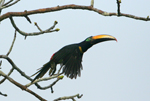A group of celebrities, including recent Academy Award winner Jared Leto, Law and Order‘s Benjamin Bratt, and Kill Bill‘s Daryl Hannah, have lent their voices to a new Public Service Announcement (see below) to raise signatures to protect Ecuador’s Yasuni National Park from oil drilling.
Considered among the most—and quite possibly the most—biodiverse ecosystem on the planet, Yasuni National Park is also home to several indigenous groups, including some who have chosen to live in isolation from the modern world. However, the Ecuadorean government has recently decided to open up the most remote portions of the park to oil exploitation.
“Yasuni is home to Ecuador’s last indigenous peoples living in voluntary isolation,” said actress Michelle Monaghan from True Detective in the announcement. “Their survival is worth more than a few days’ oil.”
Activists are working to gather 600,000 signatures from Ecuadoreans to put oil drilling in Yasuni National Park up to a national referendum.
The video was produced by Amazon Watch and Yasunidos.
Related articles
Oil or rainforest: new website highlights the plight of Yasuni National Park
(03/20/2014) A new multimedia feature story by Brazilian environmental news group, ((o))eco, highlights the ongoing debate over Yasuni National Park in Ecuador, arguably the most biodiverse place on the planet.
Ecuador’s government shuts down indigenous rights organization over oil battle
(12/10/2013) Last Wednesday, the government of Ecuador shutdown the indigenous rights NGO, Fundación Pachamama, in Quito over the group’s opposition to oil drilling in indigenous areas. More than a dozen government officials showed up at Pachamama’s office with a resolution by the Ministry of Environment that officially dissolved the organization, the first such moved by the government which in June passed an Executive Decree that tightened governmental oversight of the country’s NGOs.

(11/13/2013) The plan from Ecuador’s government was simple: Pay us and we won’t destroy the planet’s most extraordinary ecosystem. Dubbed the Yasuni-ITT initiative, the plan called upon developed nations to pay for protecting Ecuador’s Yasuni National Park from oil companies. Now, a recent study claims the plan was fraught with flaws as basic as drawing lines on a map.

(11/12/2013) In August 2012, professional photographers Ivan Kashinsky and Karla Gachet were on assignment for National Geographic in Yasuní National Park, home to arguably the most biodiverse rainforest in the world. While there, they happened to take an aerial shoot above an area known as Block 31 (see Map), a controversial oil concession located in the heart of the park, at the precise moment that the national oil company, Petroamazonas, was secretly building a new oil access road.
Could camera trap videos galvanize the world to protect Yasuni from oil drilling?

(11/07/2013) Even ten years ago it would have been impossible to imagine: clear-as-day footage of a jaguar plodding through the impenetrable Amazon, or a bicolored-spined porcupine balancing on a branch, or a troop of spider monkeys feeding at a clay lick, or a band of little coatis racing one-by-one from the dense foliage. These are things that even researchers who have spent a lifetime in the Amazon may never see. Now anyone can: scientists at the Tiputini Biodiversity Station in Ecuador’s Yasuní National Park have recently begun using camera trap videos to take movies of animals few will ever view in their lifetimes. The videos—following years of photo camera trapping—provide an intimate view of a world increasingly threatened by the oil industry.
Over 100 scientists warn Ecuadorian Congress against oil development in Yasuni

(10/03/2013) Over 100 scientists have issued a statement to the Ecuadorian Congress warning that proposed oil development and accompanying roads in Yasuni National Park will degrade its “extraordinary biodiversity.” The statement by a group dubbed the Scientists Concerned for Yasuni outlines in detail how the park is not only likely the most biodiverse ecosystems in the western hemisphere, but in the entire world. Despite this, the Ecuadorian government has recently given the go-ahead to plans to drill for oil in Yasuni’s Ishpingo-Tambococha-Tiputini (ITT) blocs, one of most remote areas in the Amazon rainforest.
The case against Ecuador’s claims of ‘low-impact drilling’ in Yasuní

(09/16/2013) Ecuador’s President Rafael Correa recently announced to the world that he was ending the 6-year initiative aimed at avoiding oil drilling in a critical piece of the Amazon, the ITT Block of Yasuní National Park. In the speech, and the accompanying Decree, the President emphasized that the exploitation will affect less than 1% of the park. In subsequent remarks, President Correa indicated that the impacted area would be less than 0.001%. Thus, the new government pitch: minimum impact, maximum reward. Here, we counter that impacts related to biodiversity, indigenous people in voluntary isolation, and climate change may be severe.
Deforestation surges as Ecuador kills Amazon protection plan
(09/04/2013) Data released this week by Terra-i, a collaborative mapping initiative, shows that deforestation in Ecuador for the first three months of 2013 was pacing more than 300 percent ahead of last year’s rate. The report comes shortly after Ecuadorean President Rafael Correa killed off a proposed plan to prohibit oil drilling in Yasuni National Park in exchange for payments equivalent to half the value of the park’s unexploited oil.
Yasuni could still be spared oil drilling

(08/26/2013) When Ecuadorean President, Rafael Correa, announced on August 15th that he was abandoning an innovative program to spare three blocs of Yasuni National Park from oil drilling, it seemed like the world had tossed away its most biodiverse ecosystem. However, environmental groups and activists quickly responded that there may be another way to keep oil companies out of Yasuni’s Ishpingo-Tambococha-Tiputini (ITT) blocs: a national referendum.














